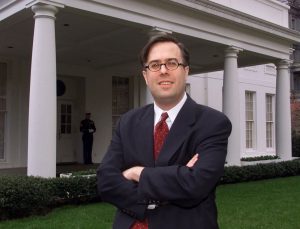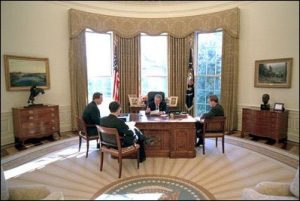“The whole Christmas story is pregnant with enigma and violated expectations. The Creator pulls on a garment of blood and bone. Almighty God is somehow present in a fragile newborn. The deliverer of mankind is delivered, slimy with vernix, in a place smelling of dung. If God can come here, amid the shame and straw, he can come anywhere. If God came here, he has come everywhere. … God is with us. In enforced isolation and loneliness, God is with us. In chronic pain and degenerative disease, God is with us. In a shattered relationship or a cancer diagnosis, God is with us. In an intensive care unit or a mental ward, God is with us. In life and in death, God will not leave us or forsake us.” — Michael Gerson, “The Defiant Hope of Christmas,” in The Washington Post
As it happened, Michael Gerson was describing his own later life in the passage above. Heart attack at 40. Cancer. Parkinson’s disease. Deep bouts of debilitating depression. More cancer, this time brutally metastatic, followed by death. But God was with him.
Some people come to Washington to do good and stay to do well. Others come seeking raw power and influence. Most fail to change things much, regardless of their motives. Gerson came seeking to influence the powerful for good — and he largely succeeded.
Gerson, an evangelical Christian who never abandoned his faith or his principles in the often-brutal game of politics, died Nov. 17, age 58, from complications of bone cancer. He followed his first act, as chief speechwriter and senior policy adviser for President George W. Bush, with 15 years as a respected columnist for The Washington Post.

Michael Gerson, a speechwriter for President George W. Bush, poses in front of the West Wing of the White House in 2001. (AP Photo/Tim Dillon, USA Today) MANDATORY CREDIT, NO SALES
Along the way, he became one of the most influential wordsmiths in Washington history, providing the eloquent voice the gaffe-prone Bush urgently needed, especially after the 9/11 attacks. As an editorial commentator, still unapologetically conservative and evangelical, Gerson indicted the members of his own tribe who fell for Donald Trump’s brand of hateful, zenophobic populism.
‘Compassionate conservatism’
Gerson’s own brand of “compassionate conservatism,” a phrase he didn’t invent but helped Bush popularize, came out of a deeply Christian philosophy of lifting up the downtrodden, helping the needy, loving the loveless.
“Mike’s views reflected what he called a ‘Christian anthropology’ — a belief in the inherent rights and dignity of every human life,” wrote his close friend Peter Wehner, in The Atlantic. “It led him to solidarity with the weak and the suffering, the dispossessed, those living in the shadows of life. His faith was capacious and generous; it created in him a deep commitment to justice and the common good. Mike was appalled at those who disfigured Jesus and used their faith for the purposes of dehumanization.”
“Mike knew that not every question involving faith and truth could be resolved along the bright lines of the culture wars, or literally be set in Scripture.”
Another friend, Post editorial colleague Karen Tumulty, described Gerson’s approach this way: “As deep as his own Christian religious beliefs were, Mike was tolerant, accepting, even admiring of those who prayed differently. And while he was by and large a social conservative, Mike knew that not every question involving faith and truth could be resolved along the bright lines of the culture wars, or literally be set in Scripture.”
Born into a Christian family and reared in St. Louis, Gerson attended Wheaton College in Illinois, the Mecca of traditional evangelical education. He intended to continue his religious education at Fuller Theological Seminary in Pasadena, another evangelical stronghold. But Chuck Colson (the born-again, Prison Fellowship-founding Colson, not the earlier Nixon dirty trickster) hired him right out of college as a ghostwriter. He also wrote speeches for Bob Dole, worked as an aide to Indiana Republican Sen. Dan Coats and wrote for long-time Republican leader Jack Kemp — probably the original “compassionate conservative.” Then he joined U.S News and World Report to cover politics from the other side for a time.
Bush and Gerson, dynamic duo
Gerson signed on with the George W. Bush presidential campaign in 1999 and joined the Bush administration speechwriting team in 2001. Gerson and fellow evangelical Bush were a match made in heaven, at least from Bush’s perspective.
Ted Sorenson wrote most of the great lines for John F. Kennedy, who was considered a lightweight when he took office. Peggy Noonan penned many of the memorable words of Ronald Reagan, who was an expert orator but often (unfairly) dismissed as a dunce. Gerson did the same for Bush, who followed the silky-smooth charmer Bill Clinton and the inspiring Reagan into the Oval Office — and suffered by comparison with his awkward speechifying.

Karen Hughes, George W. Bush, Michael Gerson, and Karl Rove review a draft of Bush’s Republican National Convention speech at the Governor’s Mansion in Austin. (Photo by Brooks Kraft LLC/Sygma via Getty Images)
Gerson provided — or worked with others to provide — such memorable phrases as “the soft bigotry of low expectations,” characterizing the low-quality, half-hearted education experienced by minority groups in America. Revamping and improving public education was Bush’s signature policy before 9/11, and he joined a bipartisan coalition in Congress to push through the No Child Left Behind Act of 2001.
“Axis of evil,” another pithy phrase with Gerson’s stamp on it, described the trio of America’s worst foes in the age of terror (according to Bush): Iran, Iraq and North Korea.
Gerson was the principal crafter of Bush’s Sept. 20, 2001, speech to a joint session of Congress, as America was still reeling from the 9/11 attacks only days before. It set the stage for the “War on Terror,” which a large majority of Americans supported at the time. “Our grief has turned to anger, and anger to resolution,” Bush declared to a shaken nation. “Whether we bring our enemies to justice, or bring justice to our enemies, justice will be done.”
“We learn in tragedy that (God’s) purposes are not always our own.”
But the speech closer to Gerson’s heart came just three days after 9/11, when he helped Bush comfort the grieving with these words in a speech at Washington’s National Cathedral: “We learn in tragedy that (God’s) purposes are not always our own. Yet the prayers of private suffering, whether in our homes or in this great cathedral, are known and heard, and understood. There are prayers that help us last through the day, or endure the night. There are prayers of friends and strangers that give us strength for the journey. And there are prayers that yield our will to a will greater than our own. … This world he created is of moral design. Grief and tragedy and hatred are only for a time. Goodness, remembrance and love have no end. And the Lord of life holds all who die and all who mourn.”
Such words helped unite and reassure Americans during a period of deep doubt and fear. In the months and years after 9/11, Gerson’s role not just as writer but policy adviser rapidly expanded at the White House. He “might have had more influence than any other White House staffer who wasn’t chief of staff or national security adviser,” conservative pundit Bill Kristol told the Post in 2006.
But that influence, in part, would lead to the ultimate failure of Bush’s larger struggle against terror. Gerson enthusiastically joined the group of administration neoconservatives who encouraged Bush to invade Iraq, a decision that later proved to be based on the false intelligence that Iraqi dictator Saddam Hussein possessed weapons of mass destruction. The invasion rid the world of Hussein, a notorious mass murderer. But it also resulted in the deaths of thousands of American troops and tens of thousands of Iraqi civilians — and distracted from the more relevant “forgotten war” in Afghanistan and other efforts to fight global jihadism.

President George W. Bush prepares his State of the Union address with White House speechwriters Matthew Scully, left, Mike Gerson, center, and John McConnell in the Oval Office Jan. 23, 2003. (Bush Library photo)
In short, it was bad “strategery,” as Bush might have said behind closed doors, and it destroyed much of his administration’s credibility in foreign policy.
Still, Bush pressed on with his new main priority, the “Bush Doctrine,” aimed at fighting global terrorism and building democracy anywhere and everywhere. Gerson wrote much of Bush’s second inaugural address, which set forth the doctrine in detail.
We could use some “Bush Doctrine” these days, with democracy under attack in many places. But it was a bridge too far in 2005, after the bitter experience of Iraq. Americans were weary of war, and politicians in both parties increasingly questioned the motives of the Bush administration.
“The Iraq backlash also overshadowed one of Bush’s — and Gerson’s — greatest achievements.”
The Iraq backlash also overshadowed one of Bush’s — and Gerson’s — greatest achievements. The administration’s massive campaign to end AIDS in Africa had begun in an Oval Office meeting Gerson attended in 2002. Bush asked the attendees for input.
Peter Wehner, then a Bush speechwriter, described Gerson’s response: “‘If we can do this, and we don’t,’ Mike said, ‘It will be a source of shame.’ To which Bush responded, ‘That’s Gerson being Gerson!’ And so it was. The president’s Emergency Plan for AIDS Relief (PEPFAR) was the largest commitment ever made by any nation to address a single disease. Mark Dybul, a brilliant NIH researcher who crafted the plan, says that nearly 20 years later, PEPFAR has saved 20 million lives, prevented millions of new infections and changed the course of the epidemic. ‘Mike was one of the most vocal and effective advocates for PEPFAR — and later, the president’s malaria initiative,’ Dybal told me.”
To the Post
Gerson departed the Bush White House in 2006. He wrote for Newsweek before joining The Washington Post op-ed page in 2007, alongside his conservative hero, George F. Will, and other more liberal columnists. He produced two columns a week for 15 years, writing about politics, morals, faith and sometimes his own personal struggles. There and in other forums (such as PBS’ NewsHour) he won the respect and affection of his colleagues and his many readers, whether they agreed with him or not.
In recent years, Gerson looked on in horror as Trumpism increasingly corrupted conservatism, the Republican Party and the American evangelical movement. And he spoke out against the trend at every opportunity.
In a masterful essay for the Post just two months before his death, Gerson sounded like a biblical prophet, pronouncing judgment on the moral collapse of Trump-supporting evangelicals:
“Strangely, evangelicals have broadly chosen the company of Trump supporters who deny any role for character in politics and define any useful villainy as virtue.”
Anxious evangelicals have taken to voting for right-wing authoritarians who promise to fight their fights — not only Donald Trump, but increasingly, his many imitators. It has been said that when you choose your community, you choose your character. Strangely, evangelicals have broadly chosen the company of Trump supporters who deny any role for character in politics and define any useful villainy as virtue. In the place of integrity, the Trump movement has elevated a warped kind of authenticity — the authenticity of unfiltered abuse, imperious ignorance, untamed egotism and reflexive bigotry.
This is inconsistent with Christianity by any orthodox measure. Yet the discontent, prejudices and delusions of religious conservatives helped swell the populist wave that lapped up on the steps of the Capitol on Jan. 6, 2021. During that assault, Christian banners mixed with the iconography of white supremacy, in a manner that should have choked Christian participants with rage. But it didn’t. …
Having known evangelicals who live lives of moral integrity and serve others across lines of race and class, I have no intention of pronouncing an indiscriminate indictment. But all conservative Christians must take seriously a sobering development in America’s common life. Many who identify with Jesus most loudly and publicly are doing the most to discredit his cause. The main danger to conservative churches does not come from bad laws — it comes from Christians who don’t understand the distinctives, the demands and the ultimate appeal of their own faith.

Michael Gerson and Mark Shields on set with PBS.
This development deserves some woes of its own:
Woe to evangelical hypocrisy. … Woe to evangelical exclusion. In their overwhelming, uncritical support of Trump and other nationalist Republicans — leaders who could never win elections without evangelical votes — white religious conservatives have joined a political movement defined by an attitude of “us” vs. “them,” and dedicated to the rejection and humiliation of social outsiders and outcasts. From the start, the Trump-led GOP dehumanized migrants as diseased and violent. It attacked Muslims as suspect and dangerous. Even when evangelical Christians refuse to mouth the words of racism, they have allied themselves with the promoters of prejudice and white grievance. How can it be that believers called to radical inclusion are the most hostile to refugees of any group in the United States? How can anyone who serves God’s boundless kingdom of love and generosity ever rally to the political banner “America First”?
“The political calculation of conservative Christians is simple, and simply wrong.”
And woe, therefore, to Christian nationalism. Evangelicals broadly confuse the kingdom of God with a Christian America, preserved by thuggish politicians who promise to prefer their version of Christian rights and enforce Christian values. The political calculation of conservative Christians is simple, and simply wrong.
Despair and hope
For most of a decade, Gerson continued to write even as his physical illnesses worsened and his long-term depression deepened. He flirted with despair more than once, but he returned to the hope he found in Christ. In a moving 2019 sermon at the National Cathedral, he openly spoke of what he had learned in the darkness:
All of us — whatever our natural serotonin level — look around us and see plenty of reason for doubt, anger and sadness. A child dies, a woman is abused, a schoolyard becomes a killing field, a typhoon sweeps away the innocent. If we knew or felt the whole of human suffering, we would drown in despair. By all objective evidence, we are arrogant animals, headed for the extinction that is the way of all things. We imagine that we are like gods, and still drop dead like flies on the windowsill.
The answer to the temptation of nihilism is not an argument — though philosophy can clear away a lot of intellectual foolishness. It is the experience of transcendence we cannot explain, or explain away. It is the fragments of love and meaning that arrive out of the blue — in beauty that leaves a lump in your throat … in the peace and ordered complexity of nature … in the shadow and shimmer of a cathedral … in the unexplained wonder of existence itself. …
But there is this difference for a Christian believer: At the end of all our striving and longing we find, not a force, but a face. All language about God is metaphorical. But the metaphor became flesh and dwelt among us.
Farewell, Michael Gerson. You now behold that face.
Classic observations from Michael Gerson
On Christians seeking social influence:
“Christians seeking social influence should do so not by joining interest groups that fight for their narrow rights — and certainly not those animated by hatred, fear, phobias, vengeance or violence. Rather, they should seek to be ambassadors of a kingdom of hope, mercy, justice and grace. This is a high calling — and a test that most of us (myself included) are always finding new ways to fail. But it is the revolutionary ideal set by Jesus of Nazareth, who still speaks across the sea of years.”
On Jesus and politics:
“Jesus rejected the role of a political messiah. In the present age, he insisted, the kingdom of God would not be the product of Jewish nationalism. It would not arrive through militancy and violence, tactics that would contribute only to a cycle of suffering. Instead, God’s kingdom would grow silently, soul by soul, “among you” and “within you,” across every barrier of nation or race — in acts of justice, peacemaking, love, inclusion, meekness, humility and gentleness. When we act according to this counterintuitive conception of influence, a greater power achieves its aims through our seemingly aimless lives. But such a countercultural path, Jesus warned his followers, might lead to persecution or even death. And this was the path Jesus took as He walked, step by step, toward Jerusalem and the cross.
On secularization and religious speech:
“It is a real mistake to try to secularize American political discourse. It removes one of the primary sources of visions of justice in American history.”
“Scrubbing public discourse of religion or religious ideas would remove one of the main sources of social justice in our history. Without an appeal to justice rooted in faith, there would have been no abolition movement, no civil rights movement, no pro-life movement.”
On the Trump/Biden abandonment of Afghanistan:
“This is just a sliver, a fragment, of the strategic and moral disaster President Biden has wrought in Afghanistan. The military and foreign policy establishment was strong enough to resist Trump’s mania for global abdication because the 45th president was a buffoon. The 46th president got his way because he is not. Biden had the foreign policy experience and standing to insist on implementing Trump’s buffoonery — to abide by Trump’s shameful ‘peace’ deal, betray our Afghan partners, and abandon Afghan women and girls to comprehensive repression.
“How did the last gasp of ‘America First’ foreign policy become the first priority of the Biden administration? Clearly there is some strange affinity between populist isolationism and the anti-idealism of both President Barack Obama and his former vice president. Obama, you might remember, campaigned for the presidency on a promise of ‘nation-building here at home.’ At the height of his betrayal of the Syrian people, he famously argued that the United States had no duty to intervene in ‘someone else’s civil war.’ Biden’s old boss presented his serial abdications as weary realism: ‘It’s not the job of the president of the United States to solve every problem in the Middle East.”’
On evangelical leaders and Trump:
“I come back to this group repeatedly, not only because I share an evangelical background and resent those who dishonor it, but because the overwhelming support of evangelicals is the single largest reason that Trump possesses power in the first place. It was their malignant approach to politics that forced our country into its current nightmare. As white nationalists, conspiracy theorists, misogynists, anarchists, criminals and terrorists took hold of the Republican Party, many evangelicals blessed it under the banner ‘Jesus Saves.’”
On the Southern Baptist Convention cover-up of sexual abuse:
“One of the best things about the Baptist tradition — especially as it rapidly expanded out of the Great Awakening in New England, and then the American South — is that it stood up for the dispossessed. While sharing the theological views of their neighbors, Baptists were often social outsiders, looked down upon by Congregationalists, Anglicans and Presbyterians. This led them to take the part of religious minorities, oppressed by state religious establishments, in demanding freedom of conscience. Now, the SBC leadership seems to be embracing the worst of their tradition. And everyone is poorer because of it.”
On being in the political wilderness:
“I am still finding it difficult to fully embrace the Democratic Party, which denies the American progression toward justice and inclusion in other ways. But I could not advise an idealistic and ambitious young person to join today’s GOP because her ambition would be likely to destroy her idealism. Most Republican leaders can no longer be trusted with the moral education of the young on the central moral challenge of our history. Elected Republicans who are not bigots are generally cowards in the face of bigotry. And that is a shocking, horrible thing.”
On the Great Commission and Republicans:
“Evangelical Christians are tying themselves to an institution — the GOP — that is actively alienating college-educated voters, minority voters and younger voters. Evangelicals are thus entrenching a public perception that their movement consists of old, white Christians who want to restore lost social status through political power. Maybe this is because the perception is often accurate.
“But there is no strategy of Christian evangelism that would take the Republican political strategy as a model. There is no conception of the Great Commission that would present Hispanic migrants as villains or encourage Millennials to continue their flight from religious association. (Around 36% of people age 18 to 34 never attend religious services — a percentage that has roughly doubled since 2004.)”
On Jesus freeing the captives:
“For a Christian, one moment near the beginning of Jesus’ ministry draws the distinction between B.C. and A.D. Jesus stood up in a Nazareth synagogue and read from the scroll of the prophet Isaiah: ‘The Spirit of the Lord is upon me, because He has anointed me to proclaim good news to the poor. He has sent me to proclaim liberty to the captives and recovering of sight to the blind, to set at liberty those who are oppressed, to proclaim the year of the Lord’s favor.’ …
“This call is not merely political. Many are haunted by Jesus’ words, are drawn to emulate his person and find him mysteriously present in their lives. Billions of human beings — Roman emperors and Celtic tribesmen, Byzantine artists and medieval peasants, Puritan settlers and enslaved Africans, Honduran farmers and Chinese house church leaders — have claimed to feel Christ’s comfort in their suffering, his guidance in their confusion, his company in their loneliness and his welcome at the hour of their death. If this is not the work of God, it is among the strangest developments in the human story. …
“It is difficult for me to understand why so many believers have turned down a wedding feast to graze in political dumpsters.”
“I know that people inspired by this vision have done great things in the past — building hospitals for the poor, improving the rights of women and children, militating against slavery, caring for the mentally disabled, working for a merciful welfare state, fighting prejudice, improving global health. But precisely because these things have happened, it is difficult for me to comprehend why so many American evangelicals have rejected the splendor and romance of their calling and settled for the cultural and political resentments of the hard right. It is difficult for me to understand why so many believers have turned down a wedding feast to graze in political dumpsters.”
On Good Friday:
“But then, in the ninth hour, (Jesus cries out) something harder to explain: ‘My God, my God, why hast thou forsaken me?’ For those of us who find God especially present in Jesus, this prospect is jarring: God feeling abandoned by God. G.K. Chesterton finds in the text the suggestion that God ‘went not only through agony, but through doubt.’ Christianity is the only religion, Chesterton went on to say, in which ‘God seemed for an instant to be an atheist.’
“What does this mean? It means, at least, that anguish and questioning are not sins or weaknesses. They are the proper responses to the horrors of death. In the ninth hour, God gave permission for confusion. He dignified doubt. ‘At the point where men and women lose hope,’ said Moltmann, ‘where they become powerless and can do nothing more, the lonely, assailed and forsaken Christ waits for them.’
“It is easy to dismiss or ridicule the idea of God on a cross. But I would have a hard time following a philosophical abstraction. At some points in our lives, we may need a God who has entered our darkest places of uncertainty and depression. A God who can comprehend the fear of a death without significance. A God who knows the silence of God.”
Erich Bridges, a Baptist journalist for more than 40 years, retired in 2016 as global correspondent for the Southern Baptist Convention’s International Mission Board. He lives in Richmond, Va.
Related articles:
Have evangelicals become libertarians or have libertarians become evangelicals? | Analysis by Rodney Kennedy
Meet the evangelical Trump Truthers: Jenna Ellis and Eric Metaxas | Analysis by Mark Wingfield
How transactional faith led evangelicals to embrace transactional politics | Opinion by Mark Wingfield

